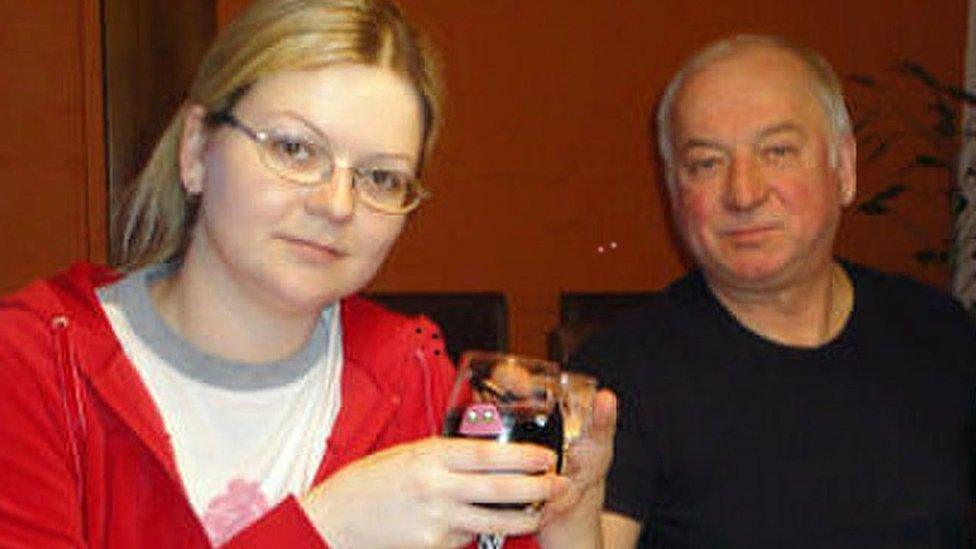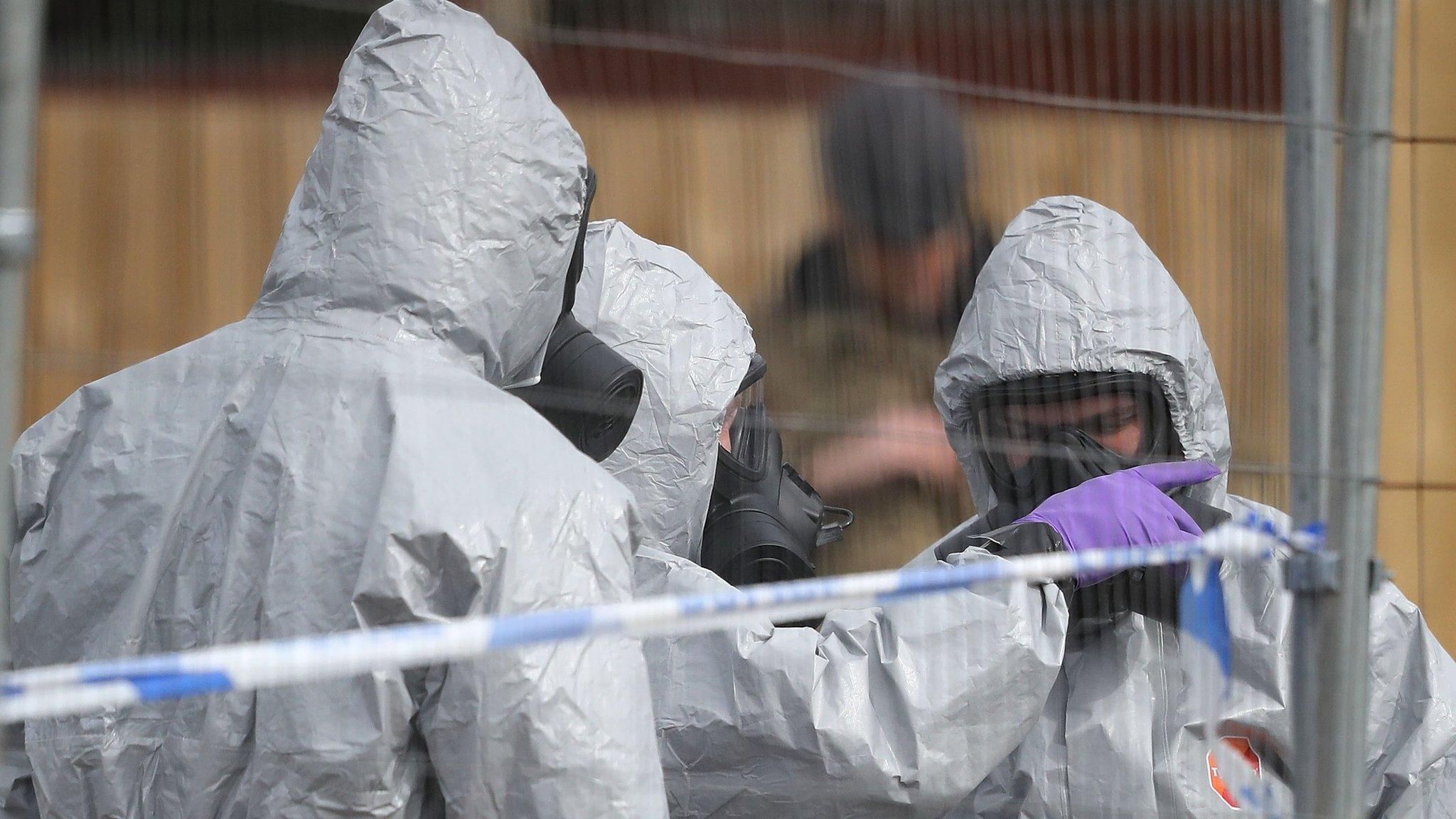Russian spy: Conspiracy theories and denial in Russia
- Published

Sergei and Yulia Skripal
Russian commentators and social media users have responded to accusations of their state's involvement in the poisoning of a former Russian spy in the UK with denial and conspiracy theories.
British Prime Minister Theresa May was unequivocal in her address to parliament saying it was "now clear that Mr Skripal and his daughter were poisoned with a military-grade nerve agent of a type developed by Russia."
"The government has concluded it is highly likely Russia was responsible for the act against Sergei and Yulia Skripal."
But Russia denies any involvement. At an urgent meeting of the United Nations security council on Wednesday, Russian ambassador to the UN Vasily Nebenzya implied the British government and allies including the United States could be responsible.
Mr Nebenzya said Mr Skripal was a "perfect victim which could justify any unthinkable lie," and asked if the attack was "something which benefits Russia on the eve of presidential elections and the world football championships?"
"I can think of a number of countries who would benefit from this incident and [from] blaming Russia," he said.
Allow X content?
This article contains content provided by X. We ask for your permission before anything is loaded, as they may be using cookies and other technologies. You may want to read X’s cookie policy, external and privacy policy, external before accepting. To view this content choose ‘accept and continue’.
On state television and social media, Russian citizens and media commentators have espoused similar theories in starker terms. Conspiracy theories implicating the UK and its allies in the poisoning of Sergei and Yulia Skripal have been widely shared in order - adherents claim without evidence - to attack Russia.
Allies condemn chemical attack on ex-spy
'They love poison in the UK'
A news bulletin on state Rossiya 1 TV accused Britain of masterminding the attack on the Skripals.
In a bizarre and unsubstantiated claim, the Rossiya 1 report referenced the plot of Sky TV series Strike Back in its allegations.
"They started preparing the UK public for the so-called Russian aggression with the use of a nerve paralytic agent at the end of last year," a Rossiya 1 correspondent said.
"It is well known that the Strike Back series is funded and created with the direct involvement of the British special services," he added.
The television series is based on a book authored by former SAS soldier Chris Ryan published in 2007.
An interviewee on Rossiya 1 identified as a "former FSB [Federal Security Service] Major General" said "all this is a well-planned provocation," adding "they love poison in the UK".
'Remarkable coincidence'
On Telegram and VKontakte, a Russian-language social network, similar allegations have circulated among pro-Kremlin channels. Much speculation centred on videos of Mr Skripal's 2004 arrest that had been uploaded to YouTube in the days before the attack.
The timing of the uploads, little more than a week before the Skripals collapsed in Salisbury, led to accusations of British complicity.
Allow X content?
This article contains content provided by X. We ask for your permission before anything is loaded, as they may be using cookies and other technologies. You may want to read X’s cookie policy, external and privacy policy, external before accepting. To view this content choose ‘accept and continue’.
Posting in Russian, one Twitter user calling themselves 'Uruguayan Intelligence' claimed the YouTube channel Group M, external was "moderated from Britain", an assertion also made on Russian state TV.
It is unclear if there is any evidence for the claim - Rossiya 1 made it citing "some information" - but despite one news presenter's declaration the upload was "a remarkable coincidence," it is not immediately obvious what it is supposed to prove. In any case, reports on Telegram suggest the decision to post the videos - and other footage of "successful detentions" - was made as long ago as 2017 for a "website for veterans".
Could Ukraine be involved?
Former FSB chief Nikolai Kovalyov, a Russian MP, suggested on Tuesday Ukraine could be involved. Tensions between Russia and Ukraine have been high since Russia's annexation of the Crimea in 2014.
"Given that all this [nerve agent] was stored on the territory of the republics of the former Soviet Union," he said, "a Ukrainian trace cannot be ruled out".
"The beneficiaries are England, America and indirectly Ukraine, because it is interested in showing Russia as an aggressor state."
There is no evidence suggesting Ukraine's involvement.
'Rhetoric from a vulgar woman'
The worsening of tensions between Russia and the UK has also been reflected in the language used by Russian officials.
After the British Defence Secretary Gavin Williamson said Russia should "go away and shut up", Russia's Defence Ministry spokesman Igor Konashenkov described it as "the rhetoric of a vulgar woman from a bazaar".
"Perhaps he lacks education," suggested Russia's Foreign Minister Sergei Lavrov.
"This is trash... can you imagine who we are dealing with?" said Foreign Ministry spokeswoman Maria Zakharova on Rossiya 1 TV on 14 March in reference to British government officials.
"These people have no idea about professionalism, diplomacy, international law, any international organisations. Second, they are simply liars. Real, fully-fledged liars."
Russia's ambassador to London, Alexander Yakovenko, told Rossiya 24 TV on Friday that Moscow had not received the answers it needed from Britain concerning the condition of Mr Skripal and his daughter and progress in the investigation.
"Unfortunately, the British often indulge in adopting such a colonial manner," he said.
You might also like:
By Ksenia Idrisova and Yaroslava Kiryukhina, BBC Monitoring, and Chris Bell, BBC UGC and Social News team
- Published15 March 2018

- Published15 March 2018
